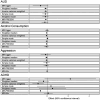This is a preprint.
Executive Function as an Underlying Mechanism of Alcohol Use, Aggression, and ADHD
- PMID: 38946945
- PMCID: PMC11213049
- DOI: 10.1101/2024.06.10.24308620
Executive Function as an Underlying Mechanism of Alcohol Use, Aggression, and ADHD
Abstract
Background: Executive functioning (EF) has been proposed as a transdiagnostic risk factor for externalizing disorders and behavior more broadly, including attention-deficit/hyperactivity disorder (ADHD), aggression, and alcohol use. Previous research has demonstrated both phenotypic and genetic overlap among these behaviors, but has yet to examine EF as a common causal mechanism. The current study examined reciprocal causal associations between EF and several externalizing behaviors using a Mendelian randomization (MR) approach.
Methods: Two-sample MR was conducted to test causal associations between EF and externalizing behaviors. Summary statistics from several genome-wide association studies (GWASs) were used in these analyses, including GWASs of EF, ADHD diagnostic status, drinks per week, aggressive behavior, and alcohol use disorder (AUD) diagnostic status. Multiple estimation methods were employed to account for horizontal pleiotropy (e.g., inverse variance weighted, MR-PRESSO, MR-MIX).
Results: EF demonstrated significant causal relationships with ADHD (P < 0.01), AUD (P < 0.03), and alcohol consumption (P < 0.01) across several estimation methods. Reciprocally, ADHD showed a significant causal influence on EF (P < 0.03). Nonetheless, caution should be used when interpreting these findings as there was some evidence for horizontal pleiotropy in the effect of EF on ADHD and significant heterogeneity in variant effects in the other relations tested. There were no significant findings for aggression.
Conclusions: Findings suggest that EF may be a causal mechanism underlying some externalizing behaviors, including ADHD and alcohol use, and that ADHD may also lead to lower performance on EF tasks.
Conflict of interest statement
The authors declare no conflicts of interest.
Figures

Similar articles
-
A bidirectional Mendelian randomization study about the role of morning plasma cortisol in attention deficit hyperactivity disorder.Front Psychiatry. 2023 Jun 14;14:1148759. doi: 10.3389/fpsyt.2023.1148759. eCollection 2023. Front Psychiatry. 2023. PMID: 37389173 Free PMC article.
-
Associations between attention-deficit/hyperactivity disorder and allergic diseases: a two-sample Mendelian randomization study.Front Psychiatry. 2023 Jul 5;14:1185088. doi: 10.3389/fpsyt.2023.1185088. eCollection 2023. Front Psychiatry. 2023. PMID: 37484661 Free PMC article.
-
The early life course-related traits with three psychiatric disorders: A two-sample Mendelian randomization study.Front Psychiatry. 2023 Mar 21;14:1098664. doi: 10.3389/fpsyt.2023.1098664. eCollection 2023. Front Psychiatry. 2023. PMID: 37025349 Free PMC article.
-
Executive Functioning and Engagement in Physical and Relational Aggression among Children with ADHD.J Abnorm Child Psychol. 2017 Jul;45(5):899-910. doi: 10.1007/s10802-016-0207-z. J Abnorm Child Psychol. 2017. PMID: 27655342
-
Two-sample Mendelian randomization analysis investigates causal associations between gut microbiota and attention deficit hyperactivity disorder.Front Microbiol. 2023 Apr 24;14:1144851. doi: 10.3389/fmicb.2023.1144851. eCollection 2023. Front Microbiol. 2023. PMID: 37168108 Free PMC article.
References
-
- Achenbach TM and Edelbrock C. (1991). Manual for the Child Behavior Checklist. In Journal of Abnormal Child Psychology (Vol. 15).
-
- Beauchaine T. P., Hinshaw S. P., Castellanos-Ryan N., & Séguin J. R. (2015). Prefrontal and Anterior Cingulate Cortex Mechanisms of Impulsivity. In The Oxford Handbook of Externalizing Spectrum Disorders. 10.1093/oxfordhb/9780199324675.013.13 - DOI
-
- Beauchaine T. P., Hinshaw S. P., Pinsonneault M., Parent S., Castellanos-Ryan N., & Séguin J. R. (2014). Low Intelligence and Poor Executive Function as Vulnerabilities to Externalizing Behavior. In The Oxford Handbook of Externalizing Spectrum Disorders. 10.1093/oxfordhb/9780199324675.013.14 - DOI
Publication types
Grants and funding
LinkOut - more resources
Full Text Sources
